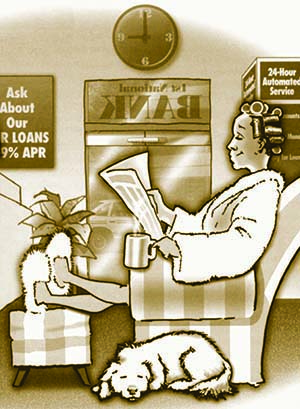
Excerpted and updated from “How to ‘Be More at Home’ with Your Bank,” Summer 1998.
Chances are you’re pretty satisfied with your bank and you’ve been a loyal customer for years. But as with any place you do business, there’s always something you can do differently or better to make you feel more comfortable and more “at home” ... and perhaps save some time and money, too.
Ask yourself, and your bank, if you’re getting the best deal. About once a year, talk to a customer services representative at your bank to make sure you’re signed up for the right programs to meet your needs. You may also want to comparison shop to make sure you couldn’t do significantly better at another bank.
Get to know bank employees you can turn to for help. Jot down the names and numbers of employees who, in-person or over the phone, seemed to be especially helpful and knowledgeable. If possible, become a familiar voice or face to them.
Don’t be afraid to raise a concern. Your bank’s managers would prefer you bring a problem to their attention and be given the chance to fix it rather than have you take your business elsewhere. If you don’t get satisfaction from a customer service representative or another employee, consider talking to a supervisor. If you’re still having problems, consider contacting the institution’s state or federal regulator.
Don’t be afraid to ask for a break. Bounce a check for the first time ever? Want a copy of an old monthly statement? Depending on the circumstances, your bank might be willing to reduce or waive a fee or penalty, especially if you’ve been a good customer. Also consider talking to your bank if you’re having problems repaying a loan. Explain the situation and any unusual circumstances. Some lenders will agree to temporary or permanent reductions in your loan interest rate, monthly payment or other charges.
Read the fine print. Knowing the costs and requirements of an account before you sign on the dotted line can prevent a complaint or hassle later. Also be very clear about whether an attractive interest rate on a credit card or a deposit is a short-term, introductory “teaser” rate good for just a short time.
Keep good records. Confirm that your monthly account statements are correct. Keep copies of any contracts or other documents you sign with the bank — loans, certificates of deposit, etc. — along with any accompanying handouts. If there’s ever a dispute, you’ll have those documents to refer back to.
